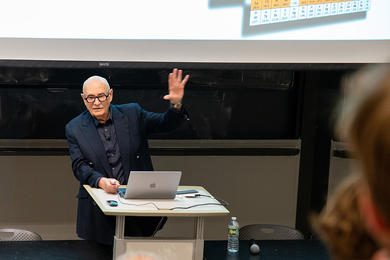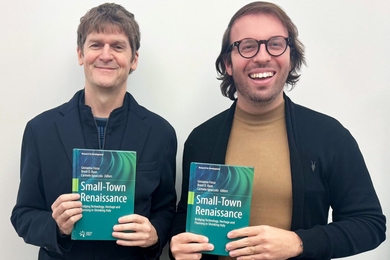Thomas Levenson, professor of science writing and director of MIT's Graduate Program in Science Writing, has been awarded the James A. (1945) and Ruth Levitan Prize in the Humanities, a $30,000 research grant that will support his investigation into the economic, cultural, and scientific history of an 18th century financial crisis known as the South Sea Bubble.
"There are always great entries for the Levitan Prize," said Melissa Nobles, the Kenan Sahin Dean of MIT’s School of Humanities, Arts, and Social Sciences. "Tom's proposal stood out in part because his project explores the deep connections between scientific developments and their larger social consequences. Tom has a unique gift for storytelling, and I really look forward to seeing what he does with the South Sea Bubble."
The Levitan Prize is awarded annually to support innovative and creative scholarship in the humanities. Established through a gift from the late James A. Levitan, a 1945 MIT graduate in chemistry who was also a member of the MIT Corporation, the Levitan Prize was first awarded in 1990.
“The material side of the award is lovely, of course," said Levenson, "but what I feel most is the pleasure of having my work valued by colleagues. When I opened the email from Dean Nobles that told me the news, I was just thrilled.”
The South Sea Bubble
The prize will support Levenson’s research on a new book focused on the South Sea Bubble and the critical role the event played in transforming money from a thing — such as a gold disc — into an abstraction. The work centers on a 1720 crisis that began with Britain dangerously in debt, confronting an offer from a hybrid bank and trading firm.
That was the South Sea Company, which offered to trade its own shares for privately held government debt. As debt-holders took the deal, the stock’s value initially went up and up. Then, the stock crashed with dire consequences.
“The South Sea Bubble is mostly known (if it's remembered at all) as the type specimen of a stock market catastrophe and an object lesson in money manias and the perils of greed. It is all of those things, but what I'm pursuing in my project is a richer, broader, and more nuanced understanding of the event,” Levenson said.
The scientific revolution and modern capitalism
“I plan to trace the roots of the bubble, it's pre-history, in the context of the 17th century scientific revolution," Levenson said. "The new ideas about money and finance that were given expression in the bubble were born of that much larger intellectual, political, and cultural shift, and the decisions that led to the bubble gain sense and significance now in light of that larger context."
“Second, I want to understand what the bubble achieved — for the usually untold story (at least in popular accounts) is the one in which Britain emerges from the South Sea disaster with the first modern bond markets, with all the rewards and risks thus implied."
"The bubble marked a key step in the development of modern financial capitalism and a huge shift in the ways and means of acquiring wealth and power, he said. “My book centers on the Bubble Year of 1720 — but more broadly it’s about how changes in the way human beings investigate experience has transformed not just the study of planets or the flight of a cannon ball, but also the way we make, get, spend, and live.”
Levenson said the prize funding will enable him to devote the forthcoming summer to the project and to hire a research assistant to further his investigations. “There is so much material now available that the process of finding records, turning information into data, and organizing their interpretation is one that deeply benefits from having help,” he said.
Previous Books
Levenson is the author of five previous books on science and the history of science: "The Hunt for Vulcan: And How Albert Einstein Destroyed a Planet, Discovered Relativity, and Deciphered the Universe" (2015); "Newton and the Counterfeiter: The Unknown Career of the World’s Greatest Scientist" (2009); "Einstein in Berlin" (2003); "Measure for Measure: A Musical History of Science" (1994); and "Ice Time: Climate Science and Life on Earth" (1989). He has also produced, directed, written, and or executive-produced more than a dozen science documentaries, most recently the PBS mini-series "Origins" (2004).
Story prepared by SHASS Communications
Director, Editor: Emily Hiestand
Senior Writer: Kathryn O'Neill










